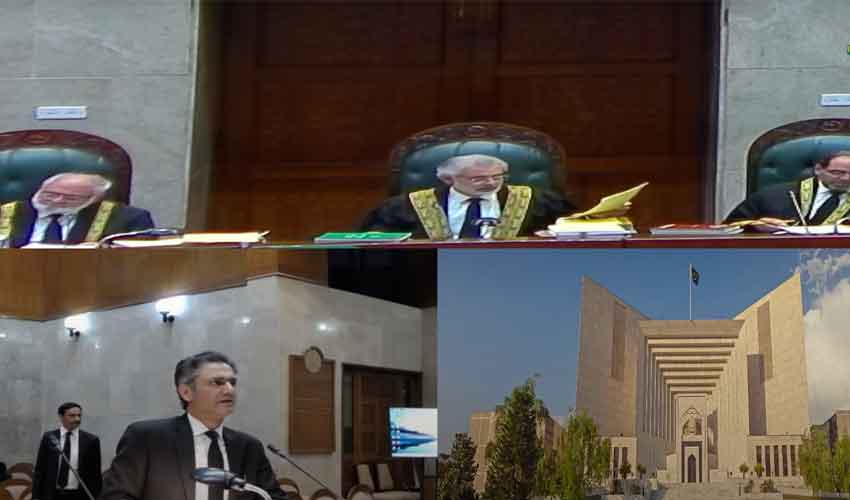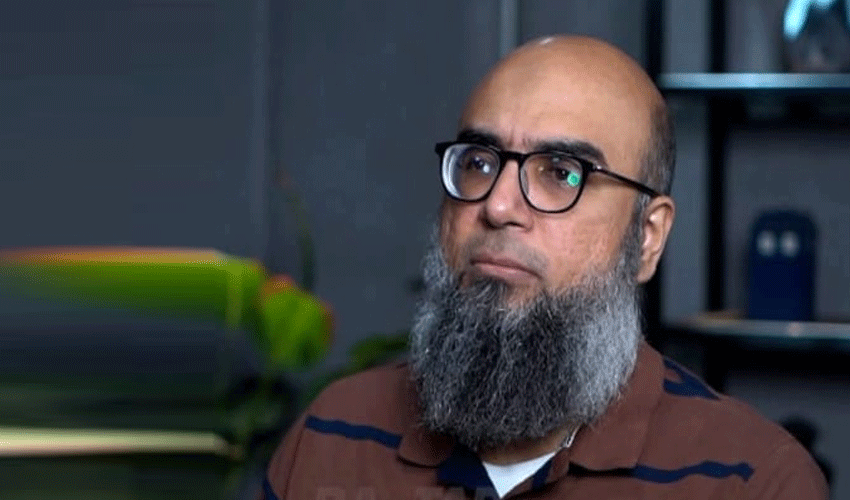Hearing the reserved seats case of the Sunni Ittehad Council (SIC), the Supreme Court (SC) examined whether the Election Commission of Pakistan (ECP) committed a constitutional violation.
Justice Athar Minallah remarked that the election commission had itself committed a serious violation of the Constitution, and questioned if, as guardians of fundamental rights, it was the court's responsibility to correct it.
A full court bench of the Supreme Court headed by Chief Justice of Pakistan Qazi Faez Isa heard the matter, during which Attorney General Mansoor Usman Awan presented his arguments. Other members of the bench were Justice Syed Mansoor Ali Shah, Justice Muneeb Akhtar, Justice Yahya Afridi, Justice Aminuddin Khan, Justice Jamal Khan Mandokhel, Justice Muhammad Ali Mazhar, Justice Ayesha Malik, Justice Athar Minallah, Justice Syed Hasan Azhar Rizvi, Justice Shahid Waheed, Justice Irfan Saadat Khan and Justice Naeem Akhtar Afghan.
The hearing of the case was telecast live on the Supreme Court website and YouTube channel.
Counsel Makhdoom Ali Khan said according to the Constitution, the reserved seats are given to political parties and not to independent candidates, and the political parties are eligible for reserved seats when they win at least one seat. He further said that the number of reserved seats for non-Muslims was 10.
The AGP then started reading from the Constitution regarding reserved seats in 2018. He said there were 272 full seats, while elections were postponed on three, 13 independent candidates were elected, and nine joined political parties. The reserved seat formula was implemented on 256 seats and Article 51 was used in 2002 regarding such seats.
AGP Awan further said that in 2018, there were 60 women's reserved seats and 10 non-Muslim. He then informed the court about the reserved seats in provincial assemblies in 2018 and those in 2002 elections. He also told the court that under the Elections Act, the election commission had to complete all the arrangements within four months of the end of the term of an assembly.
Justice Mandokhel remarked that seats were mentioned in Article 51, not membership. Justice Akhtar said that Article 224 is an exception, otherwise no assembly seat can be left vacant, adding that the basis of parliamentary system was political parties.
"But, the question is, where did such a large number of independent candidates come from? Did the people themselves elect these people as independent candidates? Didn't the election commission itself declare these people independent? When this has happened, shouldn't the court correct this mistake? Shouldn't a legal option be adopted that would remedy this mistake?" the judge asked.
Later, the chief justice remarked that he did not hear any party saying seats should remain vacant, everyone is asking seats be given to it and not anyone else. "Why didn't the makers of the Constitution foresee that such a situation can arise? It is their job to see what is and is not in the Constitution. It is not our job," he added.
Justice Isa added that he was repeatedly talking about the words written in the Constitution, and if it was not mentioned in the Constitution or there was a mistake, the Constitution and its makers should be concerned.
Attorney General Awan said that for a parliamentary party it was necessary that a political party has won a seat in the elections, adding that a parliamentary party comes into existence after the oath of its members. Justice Mansoor Ali Shah remarked that the example of a parliamentary party is irrelevant because the issue was related to pre-election situation, and asked where the formation of a parliamentary party was mentioned in the Constitution.
The AGP said a parliamentary party is mentioned only in Article 63A, and for its application it is necessary that the parliamentary party exists. Faisal Siddiqui had said that if the Sunni Ittehad Council does not get its seats, they should be left vacant.
Justice Ayesha Malik asked that if a political party is not a parliamentary party, but wins seats in the assembly, can it be considered a parliamentary party? The attorney general said elections will determine who will be the parliamentary party, adding that independent candidates, if any, can join a parliamentary party.
Justice Yahya Afridi said that according to the AGP, according to Article 51, the SIC is not a political party, but after winning the by-election, it has become a parliamentary party. The attorney general replied that if the party wins a by-election, it can become a parliamentary party.
Justice Malik said that if the election commission did not consider the Sunni Ittehad Council a political party, how can it become a parliamentary party?
Justice Irfan Saadat asked what will happen if independent candidates do not join any parliamentary party. The law says such candidates have to join a political party in three days. On this, the attorney general said independent candidates will remain independent if they do not join any party.
Justice Minallah addressed the attorney general, saying the basic question was a political party was expelled from the election by the election commission. The commission itself committed a serious violation of the Constitution. "Being the guardians of fundamental rights, isn't it our responsibility to fix it?
With that, the arguments of the attorney general were completed. The SIC lawyer said he will finish his arguments in 15 minutes. Later, the Supreme Court adjourned further hearing on reserved seats till July 9.



























